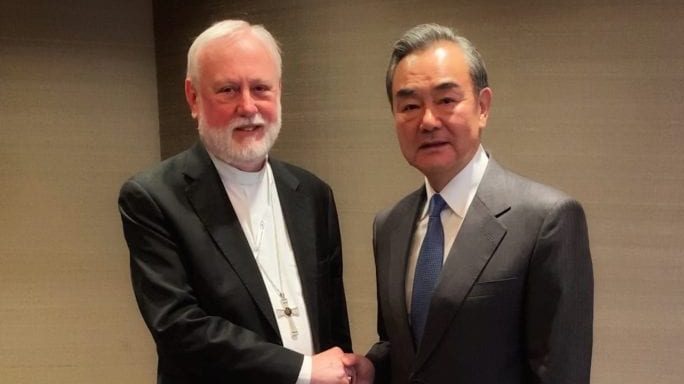Today marks the end of the annual Munich Security Conference, a gathering of the titans of the earth often referred to as the Davos of security and foreign policy issues. Ironically, the state that may have made the biggest splash wields no standing army and precious little security capacity of any sort: The Vatican.
On Friday, both the Vatican and the Chinese government announced that on the margins of the Munich summit, British Archbishop Paul Gallagher, effectively the Vatican’s foreign minister, met Chinese Foreign Minister Wang Yi of China. It marked the highest-level contact between the two sides since the Communist takeover of China in 1949.
Ironically, the meeting came almost seventy years after the 1951 expulsion of Monsignor Antonio Riberi (later to become a cardinal), the last papal “nuncio,” or ambassador, to mainland China. Riberi was driven out after reacting negatively to Communist China’s insistence on autonomy for the Catholic Church in the country, insisting, “Any so-called Independent Catholic Church…is simply a schismatic church and not the true and one Catholic Church.”
According to the scant details released publicly, Gallagher and Wang discussed developments since a landmark agreement in 2018 on the appointment of bishops in China, as well as efforts to combat the coronavirus. The brief Vatican statement said both sides hoped for “increased international cooperation to promote civil cohabitation and peace in the world.”
Earlier in the week, Pope Francis had prayed for those affected by the coronavirus in his Wednesday General Audience, expressing his closeness to the Chinese people, and invited the faithful “to pray for our Chinese brothers and sisters” who are affected by the “cruel” epidemic.
In all honesty, the content of Friday’s meeting between Gallagher and Wang is almost certainly less significant than the fact of it, since it marks another step on the path toward the eventual resumption of full diplomatic relations between Rome and Beijing.
To say the least, the Vatican’s drive to normalize its relationship with China is controversial. Retired Cardinal Joseph Zen of Hong Kong, who recently received the Wei Jingsheng Chinese Democracy Champion Prize from House Speaker Nancy Pelosi for his tireless advocacy of human rights and religious freedom in China, has objected that the Vatican is essentially selling out generations of Chinese Catholics who’ve paid in blood over the decades for their loyalty to Rome and their unwillingness to submit to state control.
Zen and others also assert that since the 2008 provisional agreement, which reportedly gave China a significant role in the selection of new Catholic bishops - one has to say “reportedly” because, to date, neither the Vatican nor China has ever released the text of the deal - crackdowns on Catholics and other religious minorities have actually become more intense.
Nevertheless, it’s been consistent Vatican policy since the era of St. Pope Paul VI to do almost anything to reopen relations with China, regarding it as essential both to fostering normal Catholic life in the country and also to the Vatican’s broader diplomatic role as a voice of conscience in global affairs.
In the language made famous by American political scientist Joseph Nye, the Vatican arguably is the world’s preeminent “soft power,” meaning a global actor that relies on diplomacy, culture and history to carry its agenda rather than political, economic and military might. It’s a major world faith that also enjoys status as a sovereign state and deploys its own diplomatic corps, and there’s little question that the pope - any pope - wields the biggest bully pulpit of any spiritual leader on the planet.
China, meanwhile, already rivals the United States as the greatest hard power on the planet, and some pundits use the term “Chinese century” to refer to the idea that the 21st century is destined to witness China’s ascendancy - some as a straight prediction, others as an alarm designed to rouse the U.S. and the West to step up their game.
Given those realities, the Vatican has regarded achieving normal relations with China as the summum bonum of its diplomatic activity for decades, long before the allegedly “maverick” Francis arrived on the scene. The conviction is that not only will Chinese believers benefit over time from being able to organize routine pastoral life out in the open, but the Vatican may be able to gradually draw China into a more constructive role among the community of nations.
If that sounds naive, perhaps it is. Yet it’s a fair question which other Western actor might be positioned to do it, especially right now. U.S. President Donald Trump has made hostility to China a staple of his stump rhetoric despite a new trade deal, the UK is consumed with the dynamics of Brexit, France is gripped by political scandals and Germany appears set for at least a full year of chaos surrounding the endgame of the Angela Merkel era. As for Italy, well … it’s Italy.
The Vatican diagnosis may be that especially now, it’s important for a stable partner capable of taking the long view of things to be in a position to engage China from within the framework of regular diplomatic contacts. Whatever one makes of that, it’s been a driving conviction in Rome for a long time, and never more than today.
Bottom line: Friday’s picture of a senior Vatican prelate and a high-ranking Chinese official isn’t likely to be the last such image to make the rounds, betokening a new era in soft and hard power relations.

